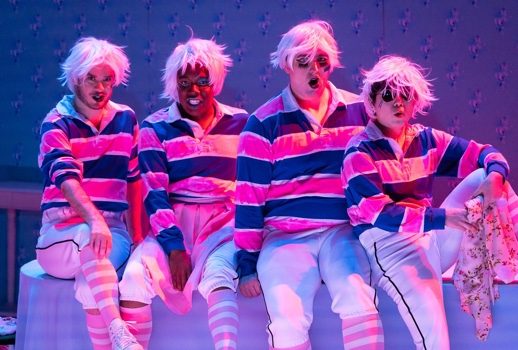
Life is a Kabarett.
The Curtis Institute of Music is known, of course, as one of the country’s premier musical training centers. In recent years, though, Curtis Opera productions have a new emphasis on theatricality.
Noted directors, including Chas Rader-Shieber and Daniel Fish, push the work in more stylish, abstract, and often illuminating ways. Perhaps the intent is to better prepare young singers, whose careers will doubtless involve Regietheater stagings; or perhaps it is to stimulate audiences. Either way, it’s a good move.
The provocative show that director Emma Griffin offers here goes beyond a reimagined staging. Two works not likely to be seen together—Kurt Weill & Bertolt Brecht’s Mahagonny Singspiel, and Gian Carlo Menotti’s The Medium—are not only combined, but configured to overlap in sometimes revealing, occasionally confounding ways. But I’ll give Griffin that it’s always visually arresting; that the cast commits fully to her vision; and best of all, that the musical values are superb.
Mahagonny comes first in the intermissionless, 90-minute evening. This short work, a sketch for the better-known opera that came a few years later, includes the familiar, crowd-pleasing “Alabama Song;” it also lays out the basic themes of greed, sin, and moral decline that Weill and Brecht would expand in the full-length version.
Musically and theatrically, this acerbic little piece has an unquestionably Weimar feel; here, it’s translated into a colorful, oddly amorphous vaudeville entertainment. The ensemble cast (tenors Seongwo Woo and Aaron Crouch, bass-baritone Tyler Zimmerman, bass Adam Kiss, and sopranos Ashley Robillard and Sage DeAgro Ruopp) are clownishly bewigged and made-up, most of them costumed in delicately patterned housecoats worn over rugby shirts.
Neither the mise-en-scene nor Griffin’s theatrical staging did much to elucidate Mahagonny, but they didn’t hurt it, either. What helped immeasurably was beautifully polished playing from the orchestra, under the sure hand of conductor Carlos Ágreda—virtues that continued through The Medium as well.
All five singers were exceptionally good, finding a perfect balance between a declamatory “operatic” style, and the more intimate, rhythmically flexible parlando of Kabarett (both styles should be at work here). Robillard and DeAgro-Ruopp duetted to exquisite effect in the “Alabama Song.”
In the cast I saw, DeAgro-Ruopp then transitioned into Monica in The Medium; moreover, the Mahagonny clown ensemble also stays onstage in the Menotti work, functioning like a sinister variant on Ariadne’s commedia troupe. It’s a strange idea, but it works. Menotti’s opera is indeed a kind of ghost story, where mysterious visitors might be expected.
More generally, I found Griffin’s theatrical rethinking far more effective in the The Medium. Though there are some deep themes here—the need to believe in something even in the face of evidence that it’s a sham, for example—the libretto itself is a Grand Guignol potboiler with a turgid, opaque plot that frankly could use some refreshing.
A truly transformative change came with mezzo-soprano Siena Licht Miller, sensational in the title role of Flora. Traditionally, the part is the provenance of aging divas with a lifetime of experience. What Miller has instead is exceptional presence and stage savvy, a gloriously ripe, distinctive mezzo-soprano, and the Junoesque beauty of a European movie star. These qualities, rare in any singer, are astonishing in one so young.
DeAgro-Ruopp, playing her daughter, brought equally potent dramatic gifts, as well as a silvery, soft-grained soprano that caressed the two most lyrical moments in the score, “Black Swan” and “Monica’s Waltz.”
As the séance guests, baritone Dennis Chmlensky and mezzos Tiffany Townsend and Hannah Klein made the most of their more limited dramatic and vocal opportunities. Special kudos to Kendra Bloom, another Curtis mezzo-soprano who here played the mime role of Toby. Bloom’s easy physicality and expressive face showed considerable artistry—without a single note to sing.
Photo: Steve Pisano


